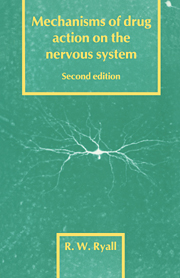Book contents
- Frontmatter
- Contents
- Preface to the second edition
- Preface to the first edition
- List of abbreviations
- 1 Introduction
- 2 Techniques
- PERIPHERAL NERVOUS SYSTEM
- CENTRAL NERVOUS SYSTEM
- 5 Central neurotransmitters and neuromodulators
- 6 The blood-brain barrier
- 7 General anaesthetics
- 8 Pain and analgesia
- 9 Drug interactions with inhibitory amino acids
- 10 Drugs used in schizophrenia
- 11 Affective and manic depression
- 12 Disorders associated with defined brain lesions
- Selected reading
- Index
10 - Drugs used in schizophrenia
from CENTRAL NERVOUS SYSTEM
Published online by Cambridge University Press: 08 October 2009
- Frontmatter
- Contents
- Preface to the second edition
- Preface to the first edition
- List of abbreviations
- 1 Introduction
- 2 Techniques
- PERIPHERAL NERVOUS SYSTEM
- CENTRAL NERVOUS SYSTEM
- 5 Central neurotransmitters and neuromodulators
- 6 The blood-brain barrier
- 7 General anaesthetics
- 8 Pain and analgesia
- 9 Drug interactions with inhibitory amino acids
- 10 Drugs used in schizophrenia
- 11 Affective and manic depression
- 12 Disorders associated with defined brain lesions
- Selected reading
- Index
Summary
There are two major type of mental illness, psychoneurotic and psychotic. Anxiety states are examples of the former and are considered in Chapter 9. Although they may be at times incapacitating, they are generally less severe and less enduring than the psychotic states. Psychotic mental illness is generally thought to be due to an organic brain lesion or disorder. However, the presumed defects have proved to be remarkably difficult to characterise, although some headway has been made in the last few years.
There are difficulties in the diagnoses of the different psychotic conditions, although this has improved in recent times with the introduction of antipsychotic drugs. The drugs themselves are not disease specific and treat the symptoms of the illness rather than the illness itself. This has led to some confusion in nomenclature and diagnosis.
Three major categories comprising personality disorders, schizophrenia and the affective disorders can be distinguished. There may be overlap of symptoms between these states. Personality disorders tend to have a long history dating back to childhood. The development of maladaptive behaviour, seen by society as behaviour that is inappropriate to its own sense of values, frequently brings the sufferer into conflict with society. Since treatment tends to be social, behavioural and psychotherapeutic, rather than pharmacological, except to treat specific temporary psychotic symptoms, these disorders will not be considered further.
It will be convenient to consider schizophrenia and the affective disorders separately, since the drugs used are quite different.
- Type
- Chapter
- Information
- Mechanisms of Drug Action on the Nervous System , pp. 171 - 192Publisher: Cambridge University PressPrint publication year: 1989
- 1
- Cited by



